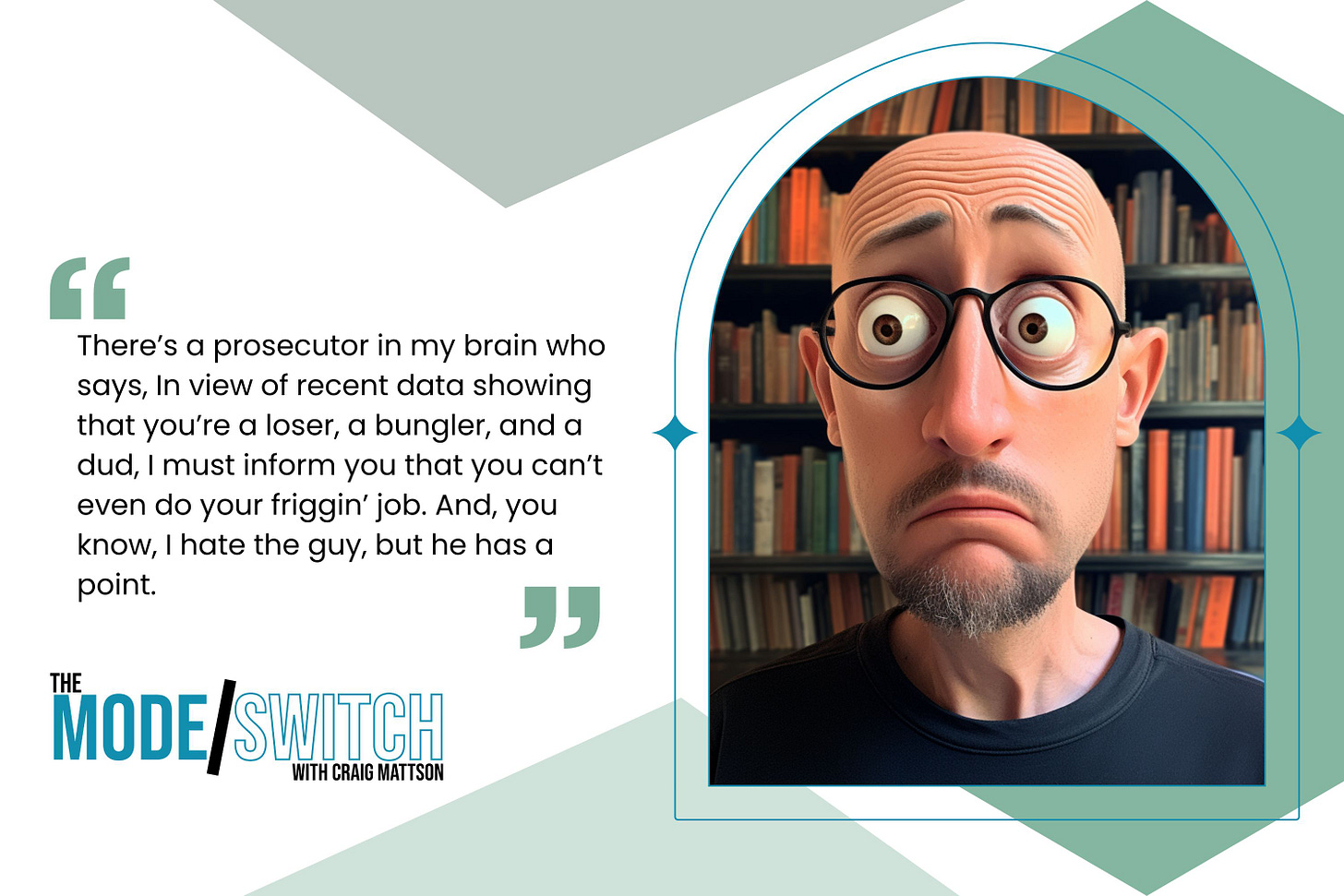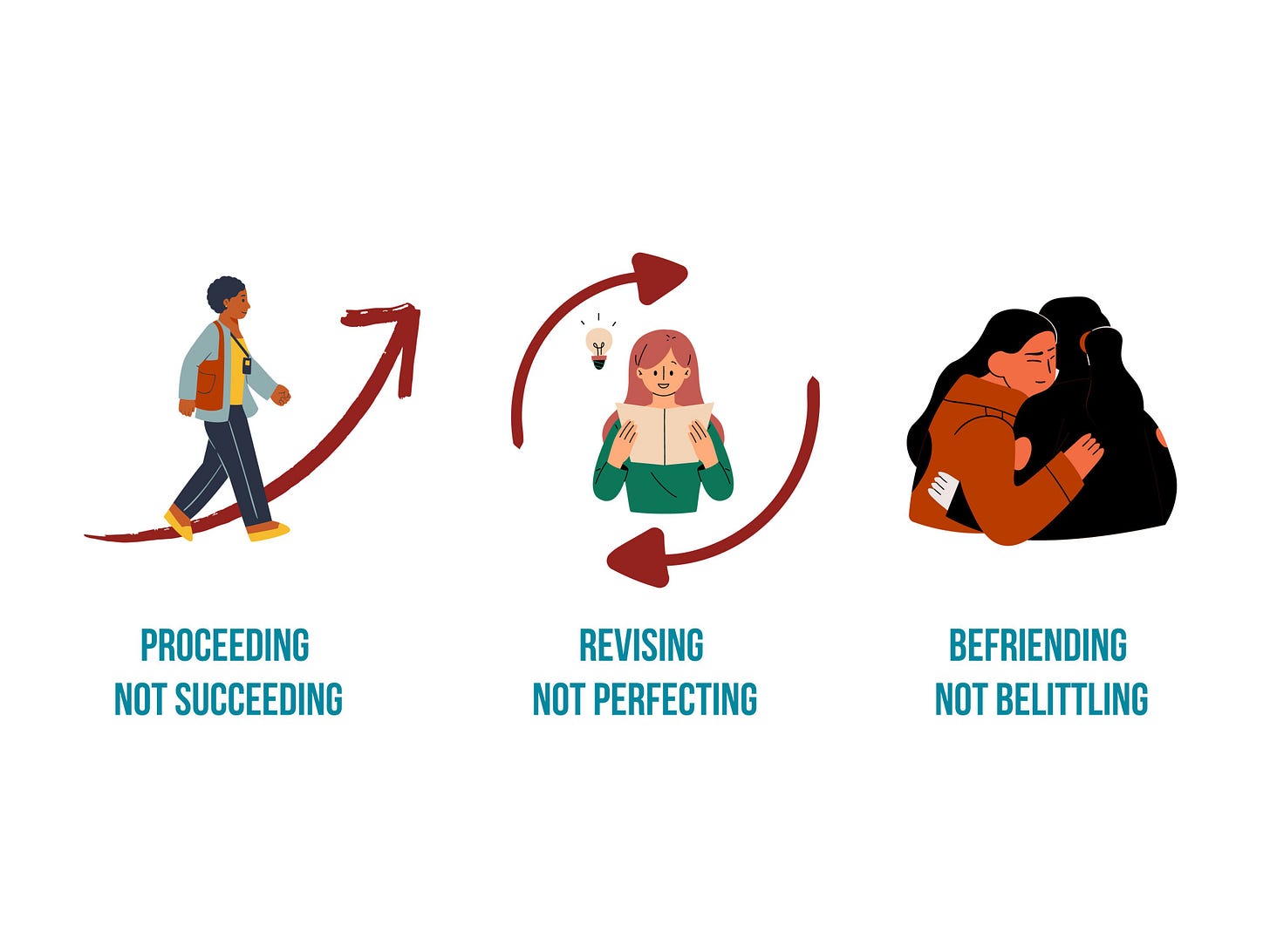Talking Back to Your Trash-Talking Brain
(Humor me while I cope with a recent professional failure)
Let’s start with a story about someone else’s trouble before we get to mine and yours.
Antoine had a gig as an electrician for a television show. Techies cope with everlasting workdays and quick minutes of super-intense tasks. When you’re a sidelined techie watching actors do their thing, nobody notices you. But when the equipment malfunctions, everybody does. And on this long, cold night, when everybody’s nerves were fully trashed, Antoine’s equipment decided to malfunction. He fixed the problem quickly, but he was so abashed that he hid out in a bathroom.
Antoine put it this way in our interview:
It’s a fast paced industry, so even if nobody is, like, in my face saying “Hurry up!”—it’s, like, pressure to perform well quickly. So I'm just, like, “OK, I'm upset and I don't want people to see me like this,” so that's why I'm like, “OK, I'll go retreat and I'll come back….”—and I cried over again.
That story makes me notice that, when a mistake happens, the hard part isn’t dealing with what other people say to you. The hard part is coping with what you say to you.
Or more accurately, what your brain says to you.
Here’s my story of dealing with my brain during a recent professional failure.
This past September, I finished some research and sent the write-up to a top-flight journal in my field. Given their competitive acceptance rate, I knew that full acceptance was unlikely. But I hoped for a revise-and-resubmit.
But sheesh, it took a long time to hear back from the editor. First, a month happened. Then another month happened. Then another month started up its engines, and—
On a sunny autumn afternoon in D. C., my plane touched down at Reagan National, and before I could get my luggage down or my seatbelt off, I checked my phone.
The decision letter had arrived. There I was, about to head into a conference full of successful researchers. And this was the sentence in my inbox:
In view of the criticisms of the reviewer(s) found at the bottom of this letter, your manuscript has been denied publication.
Wait, is that a “(s)” after “reviewers”? Are you serious? This announcement of my latest professional failure is a freaking form letter?
That’s when a nasalized voice took off in my prefrontal cortex:
In view of the criticism(s) at the bottom of that email, you’re a loser. You’re a bungler. A fizzler. A dud. A flop. And, sorry not sorry, you can’t even do your friggin’ job.
The tough part was, the trash-talker had a point. There’s no better metric for organizational research than the scrutiny of professional colleagues. And these colleagues had turned my piece down.
But, let me ask, how do you talk back to your brain when it’s trash-talking you? Let’s work through a few ideas.
Proceeding not succeeding. When you run an idea by your manager, when you unveil your work to a client, it’s easy to fall into a binary like, if they say yes, I’ve succeeded; if they say no, I failed. But your vocation’s not about ovation so much as location. When you fail, try looking around at the terrain and saying, “So that’s where this work stands. Gotcha. How do we move this forward?”
Revising not perfecting. My favorite part of the creative process is revision. I mean, it’s fun generating new ideas. But it’s even more fun making them better. The great thing about revision is, you can’t do it without learning something, even if what you learn is what doesn’t work. A Mode/Switcher texted me the other night about a campaign of hers that sorta flopped. I was kind of distraught at the thought of telling the client. Finally, I reported it to her and she was like… well a lot of marketing campaigns don’t work huh? We took our shot! What should we do next?
Befriending not belittling. The worst thing failure can do is convince you to hold yourself in contempt. That rejection email I got—it didn’t feel like it was about my work; it felt like it was about me. And that voice in my head didn’t sound like a randomized production of caffeinated cognition. It sounded like me. But instead of belaboring that belittling voice in your brain, try befriending your failure instead. That’s the mode/switch for this week. Look over the shoulder of your annoying internal prosecutor and give a warm smile to that latest lonely little professional failure. Just say, “There’s room for you over here,” and pat the seat next to you.
I write this newsletter every week because I have some sense of how hard it is to do your work and do your life. And I know, I know, I should write with fewer words. (Somebody tell me, quick, what does TLDR mean?) Maybe, though, I write these everlasting letters because I hope to convince you of one simple strong true thing:
That trash-talker in your brain isn’t your friend. But your failure can be.
-craig





